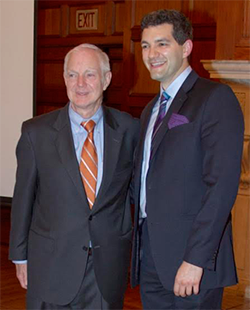As young ophthalmologists join the profession, we’re replacing senior ophthalmologists at a rapid pace. Communication between these two age groups is therefore vital, whether for YOs who need help transitioning into their first practice or for their older colleagues who are looking to partner with YOs before leaving practice.
To advance this dialogue, the Academy is creating space for discussion in both YO Info and the SOs’ quarterly Scope publication. See below for details.
Who Are SOs?
SOs are comprised of war babies and baby boomers, and their demographics are very different from YOs. First off, SOs are overwhelmingly male and white, as diversity came to characterize incoming medical school cohorts much later on. In addition, as a group, SOs:
- Tend to be more conservative in their politics and attitudes;
- Are less tech savvy;
- Think of their practices more as careers;
- Are less concerned with work/life balance; and
- Have generally been in the same organization for all or at least most of their careers.
SOs have many things have to offer YOs new to practice. For example:
1. Mentoring. YOs new to practice want guidance from the leaders of the practices that they join. And SOs are natural mentors. But this takes good communication. SOs are very different from the faculty members who train YOs and aren’t always accustomed to providing this type of feedback. As a YO, you need to be aware of this. Take the first step in engaging your older colleagues to make sure they are strike up a fruitful mentorship.
2. Learning the business. Many YOs, like many SOs at the same age, have no exposure to the business aspects of a practice. SOs have learned how to operate a business via the school of hard knocks. It is crucial that you ask detailed questions to learn the day-to-day steps of running a successful practice. Don’t be shy to ask about proper visit coding, expanding your referral base or how to expand your skills post-training.

Dr. Fleming with Dr. Chelnis during his fellowship graduation at the University of Tennesse.
3. Becoming a leader/shaping your future. Typically, when we speak about the lessons from our elders, people wax poetic about principles and long-lost solutions focused on reduced technology. But in my case, it was a senior ophthalmologist who helped me become a faster, more efficient surgeon. Watching my inexperienced mind and hands at work in my first months under his guidance, James Chris Fleming, MD, would joke, “By the time you leave here, I’m going to teach you how to eat.” Working with a SO, I learned how to be an efficient surgeon.
Many SOs will also end up working with YOs for exit strategies from their careers. It’s therefore especially important that we quickly get up to speed about the nuts and bolts of running an actual practice. In general, the smoothest and most successful transition between seller and buyer lasts several years. This allows for the best retention of established patients. During this transition, you should take full advantage of your older colleagues’ hard-won business knowledge and strengthen yourself as a leader for your patients and your practice.
Alternatively, if you’re seeking improved work-life balance, it may be advantageous to consider a practice-sharing arrangement. Some millennials may prefer part-time employment. Many SOs want to slow down and work part time themselves. This mutually beneficial arrangement may make both sides happy for years.
Get Your Questions Answered by SOs
SOs have a tremendous amount of institutional knowledge that can be incredibly beneficial to us. To help facilitate sharing this life experience, the Academy’s SO Committee and the YO Info editorial board are creating a space for YOs and SOs to interact. Send questions to yo_info@aao.org and look for answers in upcoming YO Info articles.
* * *
About the author: James G. Chelnis, MD, is the chair of the YO Info editorial board. He is an oculoplastic and reconstructive specialist at the New York Eye and Ear Infirmary of Mount Sinai in New York City. He completed his ASOPRS training at Vanderbilt University and the University of Tennessee.